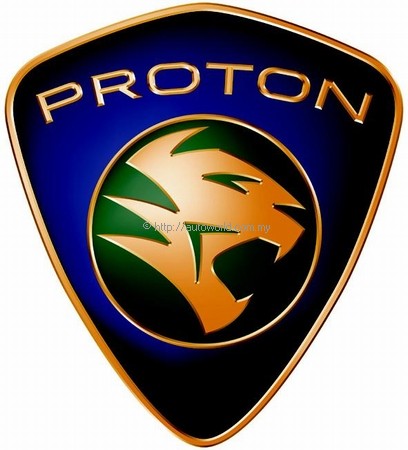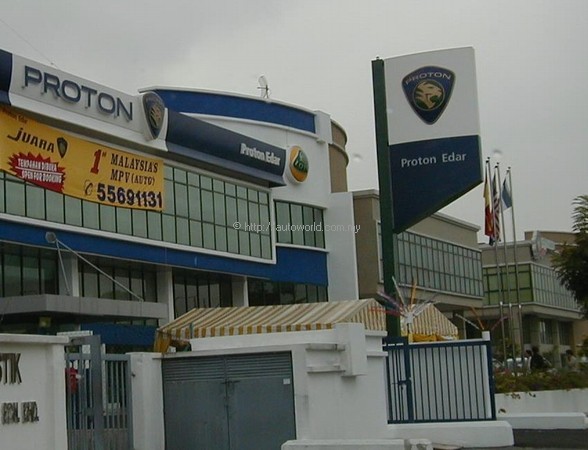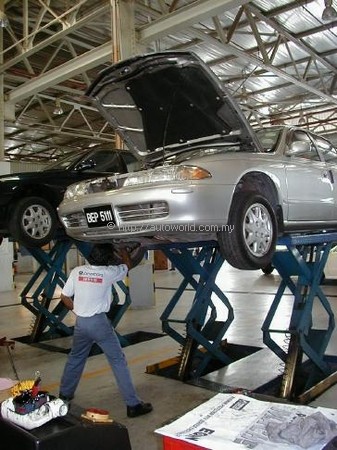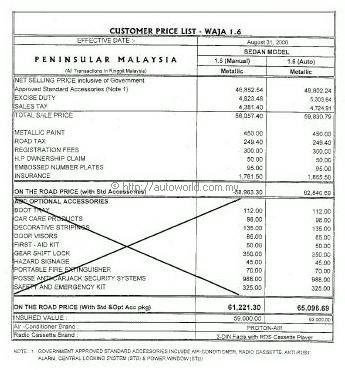More on the Proton Edar-EON Agreement
The new relationship between Proton, Proton Edar (PE) and EON which is to be formalized by the end of June 2003 marks an important development in the national car program. As reported recently, the long-drawn issue of EON’s status as a Proton distributor is finally being resolved with an arrangement whereby EON will become a ‘Super Dealer’; Proton Edar (a wholly-owned subsidiary of Proton) will become the sole domestic distributor.
At an informal luncheon with a group of media members today, Proton Edar CEO Datuk Mohd Maruan Mohd Said clarified that the Memorandum of Agreement was signed on March 31 between PE and EON but a distributorship agreement has not been officially signed and the terms of the agreement would be negotiated over the next three months.
“EON gave a firm indication that they wish to continue as a Proton Edar ‘Super Dealer’ and we both worked out this new arrangement which is a ‘win-win’ situation for all parties concerned. The terms have been laid down and while there will still be a bit of negotiation, we have agreed that the signing will occur by the end of June,” he revealed.
Both PE and EON are optimistic that the agreement will be signed, subject to mutually agreeable terms, but Datuk Maruan explained that in the event that an agreement could not be signed by the end of June, EON would still continue to be supplied with the Proton models which it has so far been selling (Perdana, Iswara Sedan, Waja and Wira Sedan). However, EON would not receive any new models which Proton would introduce in future and as Proton ceased production of the old models, the range of models available to EON would decrease.
But that is a scenario which is unlikely to happen since EON has always expressed confidence in the Proton business, even in the more competitive and liberalized AFTA era, and is keen to remain a leading retailer. In this respect, it will now be able to focus all its efforts on the retail business rather than having to also handle distribution and marketing activities, as it has for the past 18 years.
Datuk Maruan said that besides having its own retail operations, PE will have the sole responsibility for marketing matters and provide the necessary guidance and management of dealers and their activities. It would determine profit margins, undertake unified advertising and promotions and develop the sales and service network throughout the country, giving special attention to ensuring conformance to the Corporate Identity of Proton and maintenance of high standards in all areas.
“Issues concerning retail prices will be handled by PE and while margins will vary according to the model and the dealer – a ‘Super Dealer’ like EON which takes a larger volume will enjoy a better margin – retail prices and financing packages will be common for all dealers,” he said.
This means that there will be no advantage to ‘shopping around’ for a Proton as all dealers will offer the same model at the same price. Any discounting by a dealer would require approval by PE and there would also be occasions when PE would formulate joint promotions for all dealers. The ‘price control’ policy will ensure that a price war does not start between dealers, a situation that is often damaging to the smaller dealers.
However, Datuk Maruan added that as some dealers may have more or less stocks at hand, delivery times may vary so in that respect, he suggested that they visit a few dealers before deciding where to place the order.
Datuk Maruan also mentioned that the addition of extra accessories by dealers would be strictly forbidden. He stressed this point, explaining that there was consumer unhappiness in the past about accessories being forced on them. Since starting operations, PE had been receptive to all feedback from customers on the matter.
“Proton customers will also enjoy much greater convenience now as they can send their cars for servicing at any Proton service centre. Before, the situation was that those who bought their vehicles from PE could go only to PE service centres and not to EON service centres and vice-versa. Now, they can go to either EON or PE service centres for regular service as well as warranty claims, regardless of which dealer chain they buy from,” he said.
While PE will continue expanding the dealer network nationwide, especially in East Malaysia, EON will not be allowed to expand its own network under the new arrangement. This, however, concerned only EON’s network for Proton products and EON was free to develop a new network for any other brands it wants to sell.
It was also clarified that EON would not automatically get all models in the Proton range under the new relationship. PE would decide on the models that would be supplied to EON and other independent dealers but both parties had agreed that EON would take a minimum of 100,000 units a year for the period of the agreement which is said to be up till 2009. It would not be inconceivable that PE may decide to create some form of specialization among its dealers, eg some focusing on sporty models and others on vehicles with commercial applications.
The recent moves are typical of the way many leading global automakers structure their operations. The factory concentrates on developing new products and making them, and has a distribution or wholesale organization to look after marketing activities. This is evident in the establishment of Volvo Car Malaysia, Honda Malaysia and DaimlerChrysler Malaysia, all of which are subsidiaries of the respective manufacturers and handle distribution as well as coordinate marketing matters. As subsidiaries of the principals, they have the responsibility to protect and promote the brand image, something which dealers may not always be prepared to give 100% effort to.
Tengku Tan Sri Mahaleel, CEO of Proton, was present at the luncheon and said that he welcomed the new arrangement concerning the two companies. He felt that it would enhance Proton’s operations and contribute to strengthening the brand image in coming years. While he expressed a personal view that if he had an opportunity to start with a clean sheet, he would not want either PE nor EON and would do things in a different way, he acknowledged that the present set-up was a legacy and it must be some relief that he has been able to tidy things up now as he prepares for the challenges of AFTA.
On the issue of distributors contributing to R&D costs for new product development, Tengku Mahaleel agreed that such a requirement is not usually imposed by other manufacturers. However, he pointed out that Proton is a national project and there is a need for the various parties to fully participate in the whole project to ensure its continued success.
“This is a national car project for which margins should be integrated to be re-funded into technology development. If you are not part of the ‘food chain’, then don’t give; if you are, then you must share some of the expenditure,” he said when asked about the issue which had been among the points of contention for EON.
As EON’s new status now precludes the need for it to make the contribution – which could have been as much as RM300 million as a model like the Waja had cost close to RM1 billion – Proton will come out with 70% of the R&D costs while PE will contribute 30%. However, the quantum would be further discussed between the two parties to see what was the best arrangement.
EON, on its part, is happy with the new relationship and its status of ‘Super Dealer’ as it can now put the long-standing issues to rest. When asked for his comment last week, Donald Choo, EON’s Motor Group Director, said: “We welcome this new arrangement which enables EON to continue as a Proton Super Dealer.”





























